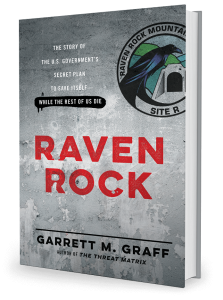Below is the text of my monthly “Editor’s Letter” in the new issue of Washingtonian.
With the fall election campaign in full swing before Memorial Day has even kicked off grilling season, Washington is caught up in a debate over what makes America great—and if we’ve lost our way.
Edward Luce’s book Time to Start Thinking: America in the Age of Descent is on bestseller lists alongside Why Nations Fail by Daron Acemoglu and James Robinson and Strategic Vision: America and the Crisis of Global Power by Zbigniew Brzezinski. President Obama himself is citing Robert Kagan’s The World America Made as evidence that the US still has a bright future.
Last week, as I slurped a bowl of spicy ramen topped with house-cured pork belly at Toki Underground on DC’s H Street, I realized those thinkers were looking in the wrong places. The author who best captured America’s greatness is George Mason University economist Tyler Cowen. My thesis was reinforced a few nights later after a hike along Rockville Pike (a long story) to eat fried eggplant at East Pearl, which features some of the area’s best Hong Kong–inspired food.
The Washingtonian’s food critics assembled this issue’s 28-page ode to American diversity by eating in strip malls, gas stations, and other corners from Annandale to Bowie. Sure, we have a section on “American food,” but the truth is the entire Cheap Eats list is about American food, because as Cowen argues in his new book, An Economist Gets Lunch: New Rules for Everyday Foodies—which we excerpted last month—“American food is immigrant food.”
That’s something onetime Georgia senator Wyche Fowler understood better than most politicians. In the 1980s, he constructed a geopolitical theory of Washington restaurants: When a revolution ignites overseas, a flame is lit beneath stoves here—as the upper middle class flee their homelands, some inevitably move to our nation’s capital and open restaurants. A look at the Cheap Eats list bears out Fowler’s theory. We’ve got restaurants born of political unrest in El Salvador, Lebanon, Bosnia, Ethiopia. Fowler joked that his foreign-policy dreams would come true if Soviet tanks rolled into Paris and all the French chefs scurried into our kitchens.
Immigration has influenced our culture in ways big and small—and continues to foster the entrepreneurial spirit that helped America rise to dominance. Economic historian John Steele Gordon said, “There can be no doubt that if the United States is famous for its get-up-and-go, that is because Americans are descended from those who got up and came.”
Perhaps no place illustrates this better than Four Sisters restaurant, whose origins lie in Bien Hoa, 30 miles from Saigon. There, in 1982, Kim Lai and Thanh Tran uprooted their four girls and two boys to come to DC, where they ran hot-dog trucks before opening a restaurant in Falls Church’s Vietnamese mecca, the Eden Center. Though Thanh had never trained as a chef, she was obsessed with making her food great. Their restaurant, Huong Que, became the spot where legions of diners first tasted Vietnam’s nuanced cuisine.
When it came time for new blood to take over, their kids did what generations of American pioneers have done: They headed west—out of the Eden Center and into Merrifield Town Center, where Four Sisters, situated between pricey condos and a Panera Bread, now offers the area’s best, most colorful, and cheapest Vietnamese dining. The owners said they were inspired by their parents’ mantra: “Either you do it or you stay and wonder.” That’s a maxim generations of immigrants understand.
Cowen argues that Europeans give short shrift to American cuisine because while Europe exports the best of its food (fancy chefs and restaurants), the US exports its worst (fast food). When Europeans come to the States, the tourist destinations aren’t often filled with our most interesting cuisines. Says Cowen: “A lot of them don’t have cars, don’t sample the suburbs, don’t understand a lot of our ethnic food, and in general they are pretty clueless about how to find good food here.”
Indeed, of the 1.7 million foreign tourists who pass through Washington each year, it’s doubtful that more than a handful make it to the Eden Center. I also didn’t see packs of tourists chewing contentedly on Peruvian beef hearts during my visit this winter to Rockville’s La Limeña, just as I didn’t share my shrimp-paste-slathered toast at Four Sisters with any European college students. That’s a shame, because the restaurant’s all-purpose condiment—the tangy fish sauce nuoc nam—is as American in its own way as ketchup.
Challenge yourself to eat at each of the places in this year’s Cheap Eats Hall of Fame and you’ll be able to explore the world on a tank of gas. Along the way, maybe you too will be convinced America’s best years aren’t yet behind us.



Recent Comments